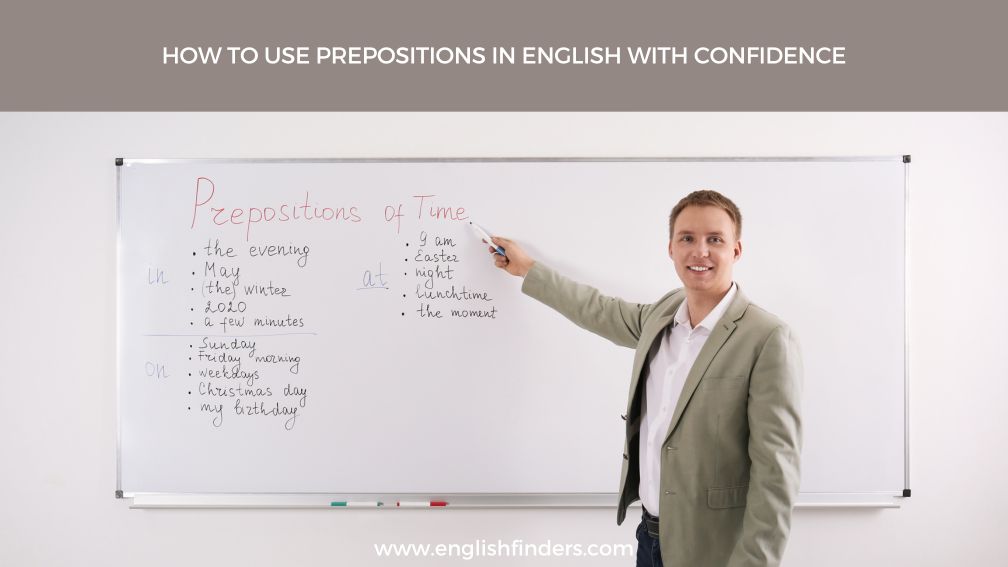Last updated on August 15th, 2024 at 02:55 pm
Mastering prepositions is a crucial step toward achieving fluency in English. Prepositions are small words that pack a big punch, often indicating relationships in time, place, or manner between words in a sentence.
However, due to their subtle nuances, they can be tricky for learners, and their usage sometimes translates directly from one language to another.
In this article, we’ll explore strategies for confidently using prepositions, which will enhance your written and spoken English. Let’s dive in.
Understanding Prepositions
Quick Navigation
Before we delve into tips and tricks, it’s essential to understand what prepositions are and why they matter. Prepositions are words that typically precede a noun or pronoun to express its relationship to another word within the sentence. This relationship can be spatial or temporal or show possession, direction, or means. Common prepositions include “at,” “by,” “for,” “with,” “about,” “under, etc.”
How to Use Prepositions in English
Now it’s time to move on to the steps on how to use Prepositions in English with confidence.
1. Context is Key
The first step to mastering prepositions is recognizing that their correct usage often depends on the context of the sentence. The same preposition can have different meanings in different situations. For instance, “I am at the store” uses “at” to indicate location, while “I laughed at the joke” uses “at” to indicate the direction of an action. Paying attention to the context in which prepositions are used can help you understand their meanings and how they connect the elements of a sentence.
2. Learn Prepositions in Phrases
One effective strategy is to learn prepositions as part of phrases rather than in isolation. Many prepositions are used in fixed expressions, and memorizing these can help you use them correctly. For example, “interested in,” “afraid of,” and “good at” are fixed expressions. By learning prepositions within the context of phrases, you’ll be more likely to remember the correct prepositions to use in different situations.
3. Practice Through Reading and Listening
Exposure to well-written English, through reading and listening, is invaluable for understanding how prepositions are used in real-life contexts. Reading books, articles, and other materials in English can help you see prepositions in action. Similarly, listening to English podcast songs and watching movies can help you hear how native speakers use prepositions naturally. Please pay close attention to prepositions during these activities and try to notice patterns in their usage.
4. Use Visual Aids
Visual aids can be beneficial for spatial prepositions such as “in,” “on,” and “at.” Drawing diagrams or gestures can help you remember how these prepositions relate to space and movement. For example, you might use a diagram of a box to show that “in” refers to something inside the box, “on” refers to something resting on its surface, and “at” refers to a specific point or location.
5. Practice Regularly
Like any other aspect of language learning, practice is key to mastering prepositions. Try writing sentences using different prepositions and ask a teacher, tutor, or native speaker for feedback. You can also practice speaking by describing pictures, scenes from a movie, or events in your life, focusing on using prepositions correctly to express relationships between objects and actions.
6. Don’t Be Afraid of Mistakes
It’s important to remember that making mistakes is a natural part of the learning process. If you misuse a preposition, it’s an opportunity to learn and improve. Don’t let the fear of making mistakes prevent you from practicing and using prepositions in your English conversations and writing.
Conclusion
Prepositions may be small, but they are mighty elements of the English language that require attention and practice to master. You can use prepositions confidently by understanding the role of context, learning prepositions in phrases, and immersing yourself in the language through reading and listening.
Visual aids, consistent practice, and a positive attitude toward mistakes will further enhance your proficiency. Remember, mastering prepositions is a step toward more nuanced and effective communication in English, opening up a world of opportunities for personal and professional growth.

Azizul Hakim is the founder & CEO of englishfinders.com. He is a passionate writer, English instructor, and content creator. He has completed his graduation and post-graduation in English language and literature.




